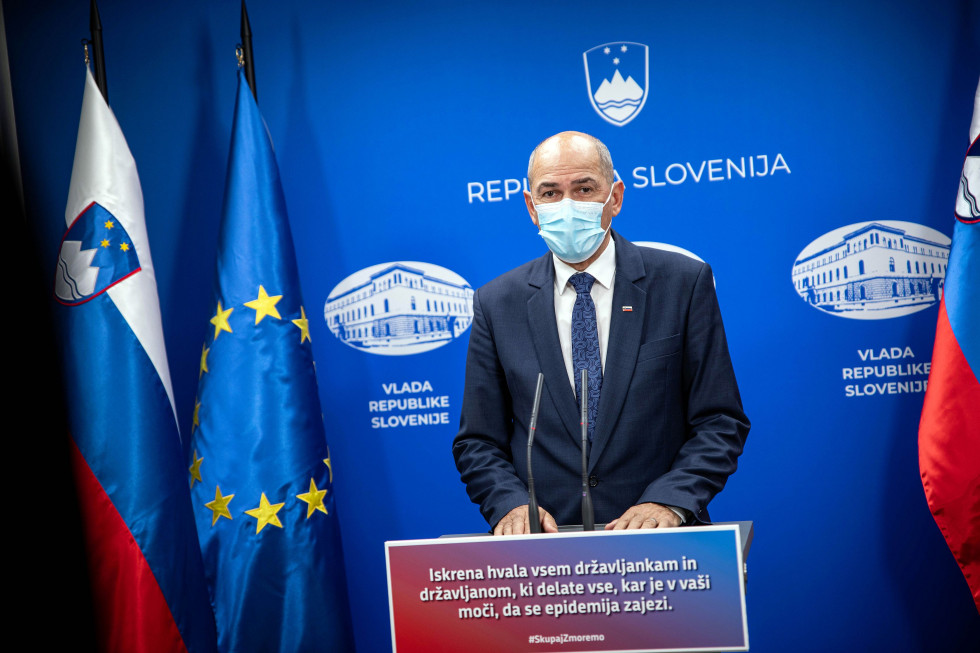By: F.D., gov.si
Prime Minister Janez Janša today addressed the participants of the 15th Slovenian Economy Summit via video. He said, among other things, that the victors of tomorrow are those who are flexible, creative, curious, and dare to think outside the established frameworks. In order to succeed, we need the know-how that is connected with digitalisation and innovation. Skills in artificial intelligence, robotics, nanotechnology, and quantum computers are necessary.
The central theme of this year’s conference, organised by the Chamber of Commerce and Industry of Slovenia via video, pursues the motto “Winners even after the crisis”. By organising the conference, business people wished to promote ambition and optimism because they believe that not only can the current issues be overcome, but we may also take advantage of the several opportunities in the future. In addition to the Prime Minister, other businessmen also addressed the participants with their stories – Tadej Pogačar gave his own example of how to succeed, and also Robyn Benincasa, an American who is one of the most influential and prestigious motivational speakers in the world.
Below is the text of the message that Prime Minister Janez Janša gave via video:
“Dear participants of the 15th Slovenian Economy Summit, thank you for your invitation and for giving me this opportunity to address you all.
Slovenia managed to negotiate approx. EUR 10.5 billion in the multi-annual financial framework and recovery package, of which EUR 6.6 billion are grants. This is the highest amount of funds that Slovenia has managed to negotiate in its history. Funds are made available for research, development, innovation, digitalisation, and education and training for the professions of tomorrow. We therefore have a sufficient amount of funds to be Winners even after the crisis, as is the title of today’s meeting.
In order for Slovenia to reach the average development rate of the EU by 2030, or reach Austria by 2050, its average GDP growth must be 50% higher than the assumed value in Slovenia’s development strategy.
The biggest hindrance for Slovenia’s development is excessive bureaucratisation. It prevents companies from growing and forces them to search for other countries with a more business-friendly environment in order to operate normally. It also has a negative impact on the decisions of investors. The Government therefore established the Strategic Debureaucratisation Council, which has already prepared a comprehensive package of measures aimed at simplifying procedures, which will have a stimulative impact on the development of the Slovenian economy. In the Intervention Act to Remove Obstacles to the Implementation of Significant Investments to Start the Economy After the COVID-19 Epidemic, the Government also enabled the launch of several infrastructure projects that had guaranteed financial assets, but were at a standstill, due to the various bureaucratic obstacles.
Due to the measures that have been adopted so far, Slovenia finds itself in a good position to fight the negative consequences of the pandemic, and to successfully enter the fourth industrial revolution. This was confirmed by the four largest international credit rating agencies as well. By increasing the credit rating of the Republic of Slovenia, they confirmed that Slovenia remains a stable and trustworthy country for investors on international financial markets. Their reports praised the quick and efficient response of the country to the outbreak of the epidemic. Slovenia’s current borrowing conditions on financial markets are further proof of the country’s successful confrontation with the negative impacts of the epidemic, where we are borrowing money under historically low interest rates.
The world is at the brink of the fourth industrial revolution. We are faced with a new international environment which requires a pragmatic shift in our thinking. In order to succeed, we need the know-how that is connected with digitalisation and innovation. Skills in artificial intelligence, robotics, nanotechnology, and quantum computers are necessary. Those who are flexible, creative, curious, and dare to think outside the established frameworks, those people will win.
In light of the above, Slovenia signed a strategic partnership agreement last week with the United States of America, the number one global economic superpower, on cooperating in the peaceful or civil use of nuclear power. In addition, Slovenia also signed a cooperation agreement in the field of innovation with Israel. Israel is the sixth most innovative country in the world, and ranked second in artificial intelligence achievements, which is also one of our priorities.
Dear entrepreneurs, despite the complicated circumstances surrounding COVID-19 that have challenged you greatly in terms of survival, I am delighted by your optimism and ambition. My government is doing everything in its power to preserve the potential of the Slovenian people and economy. I believe that together we can find solutions to these challenges; we can realise them and create new opportunities. Meetings such as this one today is a step forward on this path. The questions you will be asking yourselves are important for Slovenia in terms of the challenges brought forward by development, as well as necessary. I wish to have an interesting and constructive discussion which will give room to new ideas and solutions, and bring answers to the issues of the present moment.”

